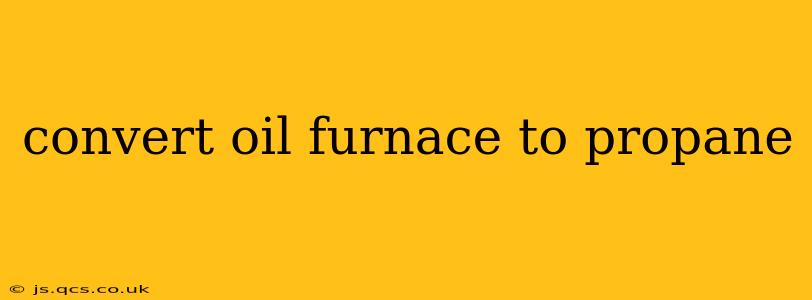Switching from oil to propane for your home heating system can offer significant advantages, including potentially lower fuel costs and a cleaner-burning fuel source. However, converting an oil furnace to propane isn't a simple DIY project. It requires professional expertise and careful planning. This comprehensive guide will walk you through the process, addressing common questions and concerns.
What are the benefits of converting from oil to propane?
Many homeowners choose to convert from oil to propane for several compelling reasons. Propane is generally more readily available than heating oil in some regions, leading to potentially better price stability and easier access to fuel delivery. Additionally, propane burns cleaner than oil, resulting in fewer emissions and potentially lower maintenance costs over the long term. This cleaner burning also often translates to a more efficient heating system, though this depends heavily on the specifics of your furnace and system. Finally, propane appliances often boast higher AFUE (Annual Fuel Utilization Efficiency) ratings compared to older oil counterparts, leading to energy savings.
What's involved in converting an oil furnace to propane?
Converting an oil furnace to propane is not a straightforward task; it's a complex undertaking best left to qualified HVAC technicians. The process involves several key steps:
- Assessment: A professional will inspect your existing oil furnace and assess its suitability for conversion. Not all oil furnaces are easily adaptable to propane. Older models might require significant modifications or even complete replacement.
- Component Replacement: Several components need to be replaced or adjusted to handle propane, including the burner, fuel lines, regulator, and possibly the control system. Propane requires different pressure and flow rates than oil, making these adjustments critical for safety and efficiency.
- Vent System Check: The venting system needs to be inspected and potentially modified to meet propane safety regulations. Propane venting requirements differ slightly from those for oil, particularly concerning ventilation clearances and materials.
- Safety Testing: Once the conversion is complete, a thorough safety test must be conducted to ensure all components are functioning correctly and safely. This is crucial to prevent any potential gas leaks or malfunctions.
Is it cheaper to convert an oil furnace to propane or replace it?
The cost-effectiveness of converting versus replacing depends on several factors. The age and condition of your existing oil furnace play a crucial role. An older, less efficient furnace might not be a good candidate for conversion, making replacement a more economically sound option. The cost of conversion itself can vary widely based on the complexity of the job and your geographical location. Obtain quotes from multiple reputable HVAC professionals to accurately compare costs.
Can I convert my oil furnace to propane myself?
No, attempting a DIY conversion is strongly discouraged. Propane is a highly flammable gas, and improper installation or modification can lead to serious safety hazards, including fires and explosions. Only qualified and licensed technicians with specific training in propane system installation should undertake this conversion.
How much does it cost to convert an oil furnace to propane?
The cost to convert an oil furnace to propane varies greatly. It depends on factors like your furnace's age and condition, the complexity of the conversion process, and your location. You should expect to pay several hundred to well over a thousand dollars for a professional conversion. It's essential to get multiple quotes from reputable HVAC companies before making a decision. Factor in the cost of propane system installation and any necessary permits as part of your overall budgeting.
How long does it take to convert an oil furnace to propane?
The time required for conversion varies depending on the complexity of the project. A straightforward conversion might take a few hours, while more extensive work could take a full day or even longer. It's best to plan for potential delays and schedule the conversion during a time when you can be flexible.
What are the potential problems with converting an oil furnace to propane?
While conversion is usually successful, potential problems can include: incompatibility with the existing furnace model, unexpected component failures during the conversion process, and unforeseen issues with venting modifications. Choosing a reputable and experienced HVAC technician significantly minimizes these risks.
By carefully considering these factors and working with qualified professionals, you can make an informed decision about whether converting your oil furnace to propane is the right choice for your home and budget. Remember, safety should always be the top priority.
